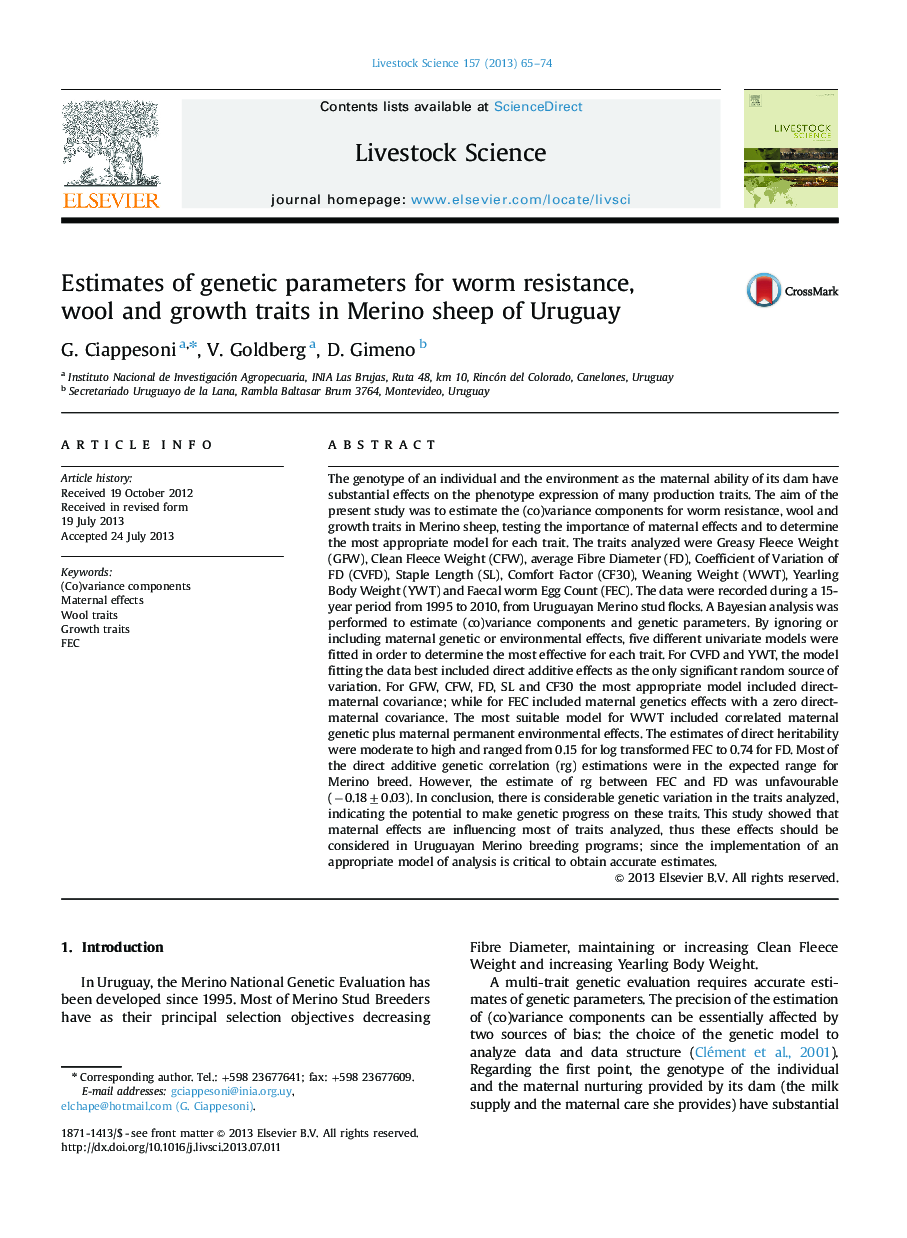| کد مقاله | کد نشریه | سال انتشار | مقاله انگلیسی | نسخه تمام متن |
|---|---|---|---|---|
| 5790348 | 1109492 | 2013 | 10 صفحه PDF | دانلود رایگان |
عنوان انگلیسی مقاله ISI
Estimates of genetic parameters for worm resistance, wool and growth traits in Merino sheep of Uruguay
ترجمه فارسی عنوان
برآورد پارامترهای ژنتیکی مقاومت کرم، ویژگی های پشم و رشد در گوسفند مرینو اروگوئه
دانلود مقاله + سفارش ترجمه
دانلود مقاله ISI انگلیسی
رایگان برای ایرانیان
موضوعات مرتبط
علوم زیستی و بیوفناوری
علوم کشاورزی و بیولوژیک
علوم دامی و جانورشناسی
چکیده انگلیسی
The genotype of an individual and the environment as the maternal ability of its dam have substantial effects on the phenotype expression of many production traits. The aim of the present study was to estimate the (co)variance components for worm resistance, wool and growth traits in Merino sheep, testing the importance of maternal effects and to determine the most appropriate model for each trait. The traits analyzed were Greasy Fleece Weight (GFW), Clean Fleece Weight (CFW), average Fibre Diameter (FD), Coefficient of Variation of FD (CVFD), Staple Length (SL), Comfort Factor (CF30), Weaning Weight (WWT), Yearling Body Weight (YWT) and Faecal worm Egg Count (FEC). The data were recorded during a 15-year period from 1995 to 2010, from Uruguayan Merino stud flocks. A Bayesian analysis was performed to estimate (co)variance components and genetic parameters. By ignoring or including maternal genetic or environmental effects, five different univariate models were fitted in order to determine the most effective for each trait. For CVFD and YWT, the model fitting the data best included direct additive effects as the only significant random source of variation. For GFW, CFW, FD, SL and CF30 the most appropriate model included direct-maternal covariance; while for FEC included maternal genetics effects with a zero direct-maternal covariance. The most suitable model for WWT included correlated maternal genetic plus maternal permanent environmental effects. The estimates of direct heritability were moderate to high and ranged from 0.15 for log transformed FEC to 0.74 for FD. Most of the direct additive genetic correlation (rg) estimations were in the expected range for Merino breed. However, the estimate of rg between FEC and FD was unfavourable (â0.18±0.03). In conclusion, there is considerable genetic variation in the traits analyzed, indicating the potential to make genetic progress on these traits. This study showed that maternal effects are influencing most of traits analyzed, thus these effects should be considered in Uruguayan Merino breeding programs; since the implementation of an appropriate model of analysis is critical to obtain accurate estimates.
ناشر
Database: Elsevier - ScienceDirect (ساینس دایرکت)
Journal: Livestock Science - Volume 157, Issue 1, October 2013, Pages 65-74
Journal: Livestock Science - Volume 157, Issue 1, October 2013, Pages 65-74
نویسندگان
G. Ciappesoni, V. Goldberg, D. Gimeno,
